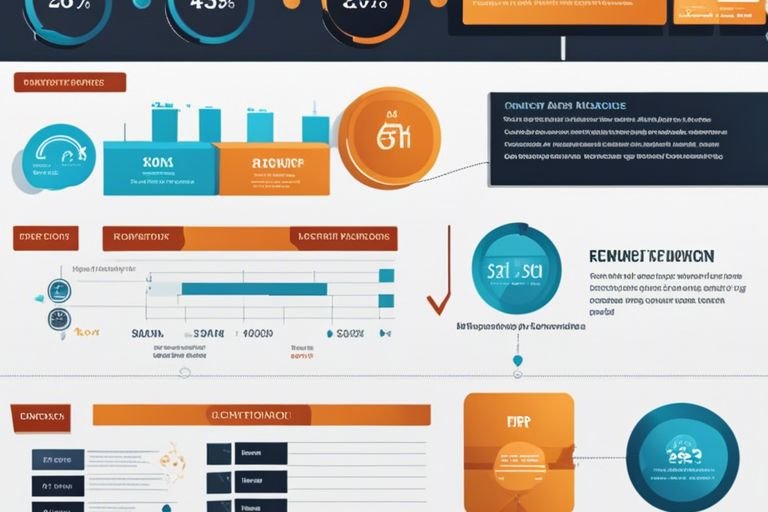How can cloud-based accounting software streamline financial processes for small businesses?

Embrace the power of cloud-based accounting software and revolutionize the way you manage your financial processes. With the ability to access your financial data from anywhere, at any time, this software provides unparalleled convenience and flexibility for small businesses. By streamlining tasks such as invoicing, expense tracking, and financial reporting, you can save precious time and eliminate the risk of human errors.
Also, cloud-based accounting software offers advanced security measures to safeguard your sensitive financial information, providing you with peace of mind while managing your business’s finances. Say goodbye to cumbersome spreadsheets and manual data entry, and say hello to the efficiency and accuracy brought by cloud-based accounting software.
The Basics of Cloud-Based Accounting Software
For small businesses, finding the right accounting software can be a game-changer. In recent years, more and more businesses are turning to cloud-based accounting software to streamline their financial processes and gain better insights into their business’s financial health. Understanding the basics of cloud-based accounting software is crucial for small business owners looking to make the switch and take advantage of its benefits.
Definition and Key Features
Cloud-based accounting software, as the name suggests, is hosted on remote servers, allowing you to access your financial data and perform accounting tasks from any device with an internet connection. Some key features of cloud-based accounting software include:
- Automatic Data Backup: Your financial data is automatically backed up to secure servers, reducing the risk of data loss.
- Real-time Collaboration: Multiple users can access and work on the same data simultaneously, improving collaboration and efficiency.
- Scalability: The software can scale with your business as it grows, eliminating the need to switch to a new system as your business expands.
- Remote Access: You can access your financial data from anywhere, at any time, making it convenient for business owners and their teams.
After understanding the definition and key features, you can see how cloud-based accounting software offers flexibility and accessibility that traditional on-premise software cannot match.
Comparing Cloud-Based Software to Traditional Accounting Methods
When comparing cloud-based accounting software to traditional accounting methods, you’ll find significant differences that can impact your business’s financial processes. Here’s a breakdown of the comparison:
| Cloud-Based Accounting Software | Traditional Accounting Methods |
| Accessible from anywhere with internet connection | Accessible only from the office or specific location |
| Real-time collaboration and data sharing | Limited collaboration, data stored in physical files |
| Automatic software updates and backups | Manual software updates and backups, risk of data loss |
| Scalable as your business grows | Limited scalability, may require transition to new system |
With this comparison, you can see how cloud-based accounting software can provide more accessibility, collaboration, and security for your financial processes compared to traditional methods.
Streamlining Financial Processes
Some of the most significant benefits of cloud-based accounting software for small businesses include the ability to streamline financial processes. This can lead to improved efficiency, accuracy, and security in managing your company’s finances.
Automation of Accounting Tasks
By utilizing cloud-based accounting software, you can automate many time-consuming accounting tasks, such as invoicing, expense tracking, and bank reconciliations. This means that you can spend less time on manual data entry and more time focusing on growing your business. The automation of these tasks also reduces the risk of human error, ensuring the accuracy of your financial records.
Real-Time Financial Reporting and Analysis
One of the key advantages of cloud-based accounting software is the ability to access real-time financial data. This allows you to make informed decisions based on the most up-to-date information, rather than relying on outdated reports. With the ability to generate customizable reports and dashboards, you can gain valuable insights into your business performance and identify areas for improvement.
Improved Data Accuracy and Security
With cloud-based accounting software, your financial data is stored securely in the cloud, reducing the risk of data loss due to hardware malfunctions or theft. Additionally, the software typically includes built-in security features such as encrypted data transmission and regular backups, ensuring the safety and integrity of your financial information. This level of security gives you peace of mind knowing that your sensitive financial data is protected.
Advantages for Small Businesses
After implementing cloud-based accounting software in your small business, you will experience numerous benefits that can streamline your financial processes and improve overall efficiency. Let’s explore some of the key advantages that this technology can offer you.
Cost Savings and Scalability
Cost savings and scalability are critical factors for small businesses When you manage your finances. Cloud-based accounting software allows you to save money on costly hardware and IT infrastructure, as everything is hosted in the cloud. Additionally, you only pay for the services you need, making it a scalable solution that can grow with your business. This means you can avoid significant upfront expenses and reduce your overall operational costs. With the ability to easily add or remove features as your needs change, you have the flexibility to scale your financial processes as your business grows.
Accessibility and Collaboration
With cloud-based accounting software, you and your team have the flexibility to access your financial data from anywhere, at any time. This means you can keep track of your finances while on the go, whether you’re at the office, at home, or traveling for business. Furthermore, the collaborative nature of cloud-based software allows you to securely share real-time financial information with your team and advisors. This level of accessibility and collaboration can greatly enhance your decision-making processes and facilitate seamless communication within your organization.
Integration with Other Business Systems
Cloud-based accounting software offers seamless integration with a variety of other business systems, such as CRM, inventory management, and e-commerce platforms. This integration allows you to consolidate your financial data with other critical business information, providing you with a comprehensive view of your operations. By integrating your accounting software with other systems, you can streamline data entry, eliminate repetitive tasks, and improve the accuracy and efficiency of your financial processes. This level of integration can empower you to make more informed business decisions and drive growth in your small business.
By leveraging the cost savings, scalability, accessibility, collaboration, and integration benefits of cloud-based accounting software, you can streamline your financial processes and position your small business for success. The flexibility and efficiency offered by this technology can empower you to focus on what matters most – growing your business.
Implementing Cloud-Based Solutions
Not all small businesses have experience with implementing cloud-based solutions, so it’s essential to approach the process carefully to ensure a smooth transition. Here are some key steps to consider when implementing cloud-based accounting software for your small business.
Choosing the Right Software for Your Business
When you choose the right cloud-based accounting software for your small business, consider factors such as the size and complexity of your financial operations, user interface, pricing, and integration capabilities with other business systems. Ensure that the software you choose is scalable and offers the features and functionalities that align with the specific needs of your business. Look for user-friendly interfaces and 24/7 customer support to ensure that you have the assistance you need when issues or questions arise.
Training and Transitioning to a New System
Once you’ve selected the right cloud-based accounting software for your small business, it’s crucial to provide thorough training to all relevant staff members to ensure a successful transition. This may involve online tutorials, in-person training sessions, or bringing in external consultants to assist with the process. Encourage your staff to embrace the new system and take the time to understand its capabilities, as this will be key to realizing the full benefits of the software.
Managing Change within the Organization
Introducing a new cloud-based accounting software system will inevitably bring about change within your organization. You have to manage this change carefully by communicating openly with your staff about the benefits of the new system and addressing any concerns they may have. Encourage a positive mindset and demonstrate how the new software will streamline processes, improve efficiency, and ultimately contribute to the success of the business. It’s crucial to maintain strong leadership and support throughout the transition period.

Streamlining Financial Processes with Cloud-Based Accounting Software
With this in mind, utilizing cloud-based accounting software can greatly streamline the financial processes for small businesses. By automating routine tasks such as invoicing, expense tracking, and financial reporting, you can save valuable time and ensure accuracy in your financial records. Additionally, the ability to access your financial data from anywhere and at any time allows for greater flexibility and collaboration within your team. This real-time access to up-to-date financial information also aids in making more informed business decisions. Furthermore, the security and backup features of cloud-based accounting software ensure that your financial data is protected and easily recoverable in case of any unforeseen events. Overall, implementing cloud-based accounting software can significantly improve the efficiency and accuracy of your small business’s financial processes.



